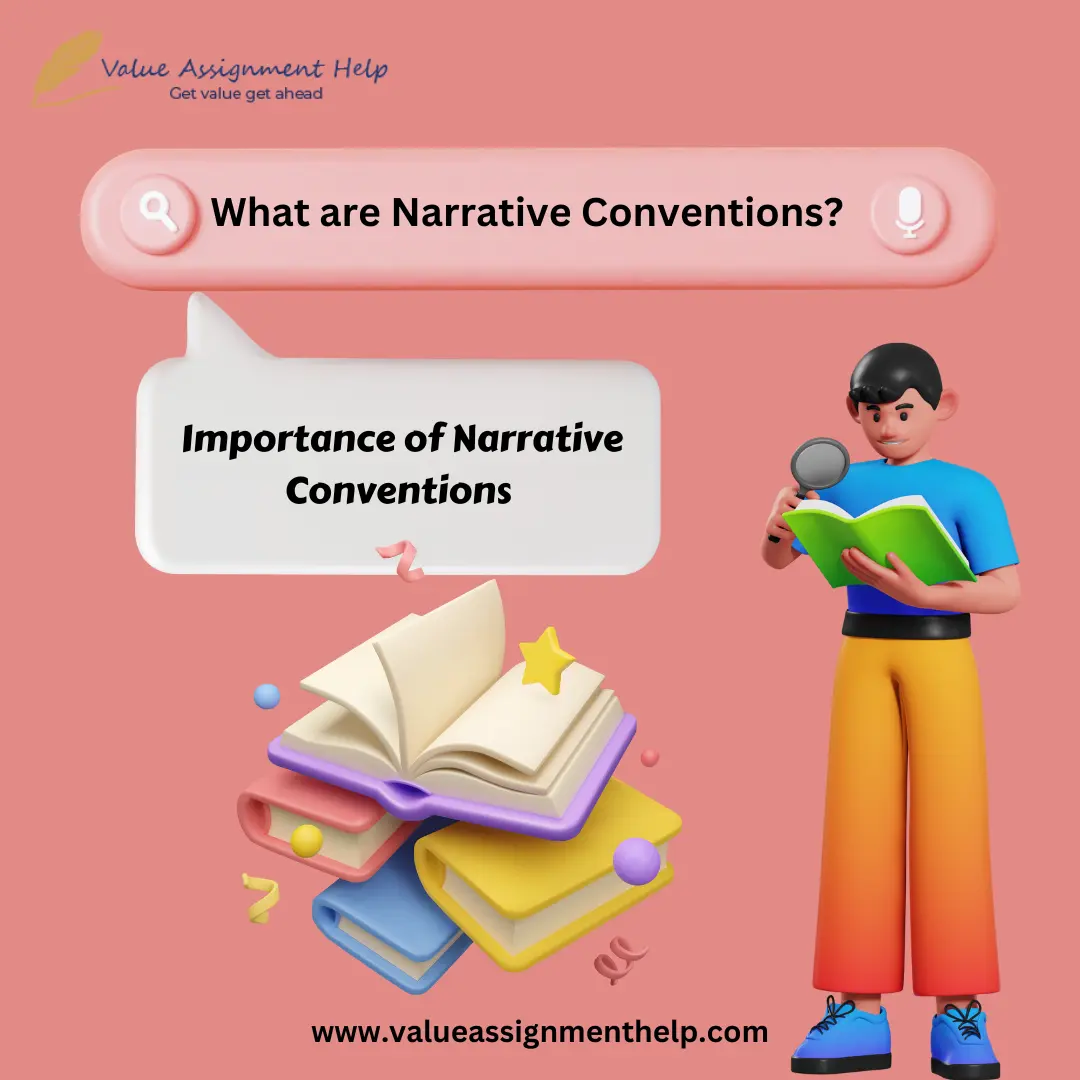
Search Assignments
Table of Contents
Our Experts

Search Assignments

Customers Reviews
Hey! Are you an avid reader? Author? Or a student of literature? If yes, then you should read this blog. Well, not only for you, but you need it the most. Isn't it? And you alone appreciate it. Has it occurred to you that while reading a book, you thought that there was something in this book or article that set it apart from others of the same genre? No, we are not talking stories here. Peculiar aspects that we as laypeople may not understand but can feel and appreciate a lot. Yes, that thing about writing that directly touches your heart and creates different emotions is called a narrative convention. Want to know more? Read along.
Writing is an art and a skill; like every art and skill, it has certain peculiarities and intricacies that are inherent in it despite the writer being aware of it. Narrative conventions are those qualities of a literary work that are observed and recognized by literature enthusiasts to know how to analyze a piece of writing critically. So let's look at what falls within the realm of the narrative tradition.

Narrative traditions are the tools and methods that authors use to tell stories and works of literature. Many techniques emphasize the specific application of phrases, punctuation marks, or exaggeration of description. But almost every storyteller, regardless of genre or genre, employs several fundamental techniques.
Each writer does their best to use the best technology to create a powerful story. Therefore, different techniques are used to share the stories with the readers. Writers try to use techniques such as character development, plot building, role narration and making stories real for the readers.
Some commonly used narrative techniques are:
In these novels, the narrator describes their personal life. The characters in these novels also belong to the author's coworkers or real-life friends. These novels usually grab readers' attention who genuinely admire that particular author.
In this story, the narrator tries to gather information about the past and details of historical facts and figures. This story combines real people's lives, some incidents, and fictional characters. It attracts readers' attention through mysteries, stories, fantasy, series and historical romantic fiction.
These stories are told in the third person. These people are used to interacting directly with the readers, and the author uses the third person, who knows everything. They usually speak in the author's voice as they pretend to know everything about the story.
In these narrative convention techniques, the narrator considers himself the story's main character. The whole story revolves around him. The narrator gives the main character his characteristics and voice and connects the story to him. The author describes himself as I and makes it interesting. It helps the audience to connect with them by getting into their shoes. Personal diaries, mystery novels, and memoirs use these techniques to keep people entertained.
In a narrative, the plot is the sequence of events. The plot consists of background details, conflict, a climax and finally conclusion.
Many writers use plots to outline their stories before beginning the writing process. Poets can even use the concept of plot to plan the flow of their poems.
Most of the stories revolve around one or more characters. These characters are shaped by what readers see them doing. Therefore, the narrative techniques involving the characters are tied to the plot, point of view, and style.
Characters define your story. Characters are the reason readers appreciate a story.
Conflict motivates characters, influences the plot, and essentially determines the theme of a narrative.
Presenting a well-defined conflict allows readers to understand a literary work, empathize with the characters, and appreciate the complexity of the plot.
When you read a story and feel like you have been transported to another place- this is commonly referred to as the setting. This element of the story is essential. The setting establishes the place, time and environment in which the characters operate.
Presenting a suitable setting is the difference between a believable story and a story that falls flat.
The theme of the literary work should be clear. The theme helps to keep the focus on a narrative. A subject is a statement about a subject.
This is the main idea that the story's writer wants the reader to remember and understand.
Humans love to entertain and inform, and what is the oldest way to do so? Grandma loved to tell stories. We tell stories orally or in writing, or even drama series or movies are just adaptations of stories. Whatever we express, be it ideas, information or values, we do it through statements. However, the statement is not one-way communication. Through various narrative conventions, the story evokes feelings of awe, dread, wonder, love, etc., in its audience.
But, it is not a technical literary device used only by high-profile writers or filmmakers. The concept is much broader and more general than that. See, the teacher explaining something to the class is also narration; knowingly or unknowingly, there are some narrative traditions in her dialogue. We build upon the conventions of a narrative to make things exciting and enter in and out of context.
Narrative conventions can be used similarly to create a story for a written assignment. Narratives can be found in many academic texts of those writing about history or literature. The only difference is that academic writers must follow the specific guidelines required by their faculty to submit work as required. For example, an English professor might ask students to write a story about their experience in an English-speaking country and be graded based on how well they adhere to narrative traditions. If they do not do so, the work will be rejected and will not be counted in the final grade.
The rules of narrative conventions can be broken. If you don't want your story to follow the guidelines, don't use them. The most important thing for you as a writer is effectively communicating your message to your audience. However, if you're writing about something that happened in history or literature, follow whatever rules exist for academic writing. This means reading about the author or event you are describing and using their work as a reference to form your ideas.




No Comments